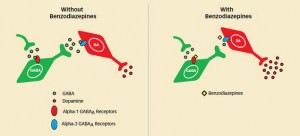ARTICLE SUMMARY: Ativan addiction can be treated with a standard detox protocol, medically assisted treatment, and psychotherapies. The safest way to quit this medication is by slowly taper the daily doses over time. Learn how to get help here.
TABLE OF CONTENTS
- How Do People Get Addicted?
- Brain Changes
- Signs of a Problem
- Am I Addicted?
- Rehab
- Treatment with Medications
- Treatment with Psychotherapy
- Stages of Treatment
- Cost
- Who to Ask for Help
- Statistics
How Do People Get Addicted?
Ativan (lorazepam) is a sedative used for the short-term treatment of anxiety, insomnia, muscle spasms and seizures. While Ativan can help many people, its addictive potential makes the medication problematic. How does it become addictive? Lorazepam, the main ingredient in Ativan, works by slowing brain activity and can induce a high when taken in large doses. In this way, Ativan can create feelings of euphoria and well-being.
The brain-reward mechanism behind this habit looks something like this:
- Take Ativan.
- Feel good.
- Repeat.
Moreover, this anti-anxiety medication is a strong benzodiazepine that works as a tranquillizer to the central nervous system. It has a high likelihood of becoming habit-forming, which is why doctors usually prescribe Ativan for short period of time, 2-4 weeks tops. However, the Controlled Substances Act still lists Ativan as a Schedule IV drug, which means that medical experts feel that has a low addictive potential.
How do people get addicted to it, exactly?
Generally speaking, people who use Ativan to treat their medical conditions are less likely to develop an addiction rather than the people who are abusing the drug recreationally. In fact, if Ativan is taken by doctor’s orders, a dependence may occur, but an addiction may not necessarily happen. Addiction is more likely to develop if you abuse Ativan by:
- Chewing Ativan to release its effects.
- Crushing Ativan and snorting it.
- Crushing Ativan and dissolving it into water in order to inject it.
- Using Ativan in higher doses than prescribed.
- Using Ativan more often than prescribed.
- Doctor shopping for Ativan.
Keep in mind that people with a past history of substance abuse are at greater risk of addiction. Actually, the approved FDA Ativan label warns:
“Addiction-prone individuals (such as drug addicts or alcoholics) should be under careful surveillance when receiving lorazepam or other psychotropic agents.”
Brain Changes
Ativan acts directly on the central nervous system by increasing the neuronal inhibition governed by GABA (gamma-aminobutyric acid). It suppresses the electrical impulses, and it slows down the brain activity by relaxing the user. Moreover, a Swiss study has proved that benzodiazepies including Ativan, affects the dopamine-producing neurons to release more dopamine. This supports the theory that addictive potential is caused by euphoric effect in some people.
But how does the brain change over time? First, doctors expect regular dosing to trigger drug dependence. When you use Ativan for more than a few weeks at a time, the brain adapts the presence of the drug as “normal”. So, when you try to stop taking the drug or even if you reduce the dose, the brain adjusts and throws you into withdrawal.
Since Ativan has sedative effects on the reasoning area of the brain, people who are under the influence of this drug may act in an impulsive manner because they are cognitive impaired, and have a lack of judgment and executive abilities. In some cases, Ativan may lead you to fatal decisions, something which recently occurred to famous rock star Chris Cornell. His wife, Vickey reported that on the night of his death, her husband told her that he may have taken an extra Ativan or two. Later that night, Chris committed suicide. More here.
Signs of a Problem
Do you think that you are addicted to Ativan? Do you suspect that a loved one may be having a problem? Here are some signs and symptoms of Ativan addiction that you can look out for. Symptoms of a drug problem can include:
- Anxiety
- Behavioral changes/switch in friendship circle
- Cold, clammy skin
- Consuming lorazepam longer than doctor directed
- Increased chemical tolerance
- Increasing dosage without medical supervision
- Insomnia
- Loss of coordination
- Low blood pressure
- Vomiting
Psychological dependence on Ativan can be paralyzing. So how do you help Ativan addiction and where can you find help? Keep reading to find out!
Am I Addicted?
Not sure that you have a problem with Ativan? You may verify your suspicions by consulting the Diagnostic and Statistical Manual of Mental Disorders (DSM-V), a manual mostly used by addiction professionals. The following criteria are present in cases of addiction:
- Take large amounts of the drug or use the drug longer than intended.
- Failed to succeed in cutting down or completely stopping the drug.
- Spend a lot of time obtaining, using, or recovering from the drug use.
- Experience cravings and an uncontrollable urge to use the drug.
- Fail to perform normally at work, home, or at school due to drug use.
- Continue to use no matter the fact it caused you many problems in relationships with family, friends, and partners.
- Give up important social, occupational or recreational activities because of use.
- Use the drug constantly, despite being aware of harmful risks and side effects.
- Continue to use despite the risk of developing health problems or worsen physical or physiological condition.
- Need more drug to get the desired effect.
- Experience withdrawal symptoms which can be relieved by taking higher dose.
If you checked some of these criteria, maybe it’s time to seek a doctor’s help to diagnose the severity of your problem. You can find a list of the main screening tools used by clinicians from the National Institute on Drug Abuse here.
Rehab
There are multiple ways addiction can be treated. Quitting Ativan cold turkey is not recommended, and ending chemical dependence on lorazepam will require professional help. Often times, a stay in rehab can help. However, each case is unique. See any of the following behavioral healthcare professionals for a full diagnosis and assessment:
- A licensed counselor or psychotherapist.
- A licensed clinical social worker.
- A medical doctor who specializes in addiction.
- A psychiatrist.
- Your family doctor.
- Treatment centers for addiction.
Treatments for Ativan problems during rehab typically include medical protocols during detox as well as behavioral therapies. Let’s take a look at each.
Treatment with Medications
Continual use of Ativan can lead to both physical and psychological dependencies. Inpatient detox programs help treat long-term use. Detox usually occurs after a gradual taper off Ativan under medical supervision. Detox centers provide professional medical staff and therapists who are also present to help Ativan addicts with anxiety problems and avoid relapse.
Experts claim that the safest way to stop using Ativan is by slowly tapering the daily dose over a period of several weeks of months. The rule of thumb of treating benzodiazepine dependence is replacing the short-acting benzo with a long-acting one, and then start with a slow reduction schedule. This is backed up by the World Health Organization, claiming that the first step of managing benzodiazepine withdrawal is to stabilize the patient on the appropriate dose of diazepam.
Aside from a tapering schedule, the most commonly used medications during detox include:
- A short half-life benzodiazepine(s).
- Phenytoin or barbiturates to control seizures.
- Propranolol to control tremors and heart rhythm, and to prevent migraines.
- Medications to manage psychosis (chlorpromazine hydrochloride, pentobarbital, phenobarbital, or haloperidol).
The Ashton Manual provides you with a simple tapering schedule from lorazepam (Ativan) 6 mg daily with diazepam (Valium) substitution.
Treatment with Psychotherapy
After medical detox, patients typically continue their treatment with behavioral and psychological therapies. The main goals of these therapies is to recognize the psycho-emotional reasons for Ativan misuse, and to help patients stay sober, and start living a healthy drug-free life. Behavioral treatment programs can be highly successful, if the patient is willing and determined to change.
The most commonly used behavioral therapies for Ativan addiction include:
- Cognitive Behavioral Therapy (CBT)
- Motivational Enhancement therapy (MET)
- Contingency Management (CM)
After lorazepam has left the system, psychotherapists can provide cognitive-behavioral therapy for Ativan addicts and will often recommend participation in a 12 step program. These programs are offered at rehab centers and help assist Ativan abusers in setting goals addressing dysfunctional emotions.
Each of the therapies mentioned above have excellent results in treating benzo addictions when properly applied. Moreover, these therapies are well-managed in both individual as well as group settings.
Stages of Treatment
STAGE 1: Assessment and Evaluation
The first stage of addiction treatment consists of two main activties: filling out paperwork and evaluation, both conducted by trained staff. The main goal of this stage is to diagnose the severity of the substance abuse disorder, which will help the professionals to create an individualized treatment plan. Usually, these assessments take about 1-3 hours, and they include:
- A physical examination
- A mental evaluation
- Gathering medical as well as family history information
- Drug testing
- Interview questioning
STAGE 2: Medical Detox
Withdrawal from Ativan may be very hard and uncomfortable to overcome. Some of the symptoms such as hallucinations may require medical supervision. Because of this, withdrawal with medical help is always recommended.
STAGE 3: Medications
The safest way to quit Ativan is by slowly reducing the daily dose over a period of few weeks or months. This method will minimize the withdrawal symptoms and prevent seizures. Ativan dependence is treated same as the benzo dependences: the short-acting benzos are replaced with a long-acting one. Moreover, the most common medication used in treating Ativan dependence include:
- A short half-life benzodiazepine(s).
- Phenytoin or barbiturates to control seizures.
- Propranolol to control tremors and heart rhythm, and to prevent migraines.
- Medications to manage psychosis (chlorpromazine hydrochloride, pentobarbital, phenobarbital, or haloperidol).
STAGE 4: Psychotherapy
This type of treatment aims to teach people how to live drug-free and how to prevent relapse. Some of the most commonly used psychotherapies in addiction treatment are:
- Behavioral therapy
- Individual therapy
- Group therapy
- Family counseling
STAGE 5: Aftercare
Step-down care is often recommended in the weeks, months, and years after you go to rehab. Aftercare can include counseling therapy sessions that can last for several months or years. Moreover, aftercare can involve some recommendations for sober housing or support groups.
Cost
Most of rehab facilities offer counseling therapies, medical detox, and other services to people who are diagnosed with substance abuse disorders. But these services do come at a price. Inpatient programs are more expensive in comparison to the outpatient ones, because they offer 24/7 medical supervision and care. The costs vary depending on the services the programs offer and the type of insurance they take.
The most common addiction services cost:
Detox: The average cost of medial detox costs anywhere between $6 and12K, according to the Health Services Research.
Psychotherapy: Psychotherapy costs from almost free to $150 or more per hour.
Outpatient treatment: On average, outpatient program ranges from $50-$135 per day.
Inpatient treatment: Rehab costs from $235-700 per day for inpatient treatment.
Look for more information about the cost of addiction treatment here.
Who to Ask for Help
Where can you find help for Ativan addiction? We’ve listed the most appropriate professionals you can turn to for help below. Know that you can also call us on the hotline number listed on this page. Trained hotline staff are knowledgeable about addiction treatment and would love to talk you through the process.
You can get help for Ativan addiction via:
Addiction treatment centers: Treatment centers can provide professional care for Ativan addicts in need of help. These centers can provide both acute detox services and therapy, as well. Treatment centers will also provide aftercare solutions to minimize risk of relapse after program completion.
Detox clinics: Detox clinics are important for heavy users and address physical dependence on Ativan. After initial detox, clinics may offer referrals to counseling and therapy. Detox combined with support groups and counseling can be highly effective solutions for preventing relapse and helping support the patient psychologically.
Medical professionals: You can ask a number of medical professionals for help with Ativan addiction. This includes your family doctor, general physician, a psychiatrist, or psychologist.
Social service workers: A licensed clinical social worker can also refer you to addiction treatment services in your area. Additionally, community or religious leaders can also point you in the right direction when seeking help for Ativan addiction.
Support Groups: Support groups for Ativan addiction are provided in 12 step programs that meet on a voluntary basis. Joining a community to share experiences with others and seek advice offers help for free where Ativan addicts are welcomed.
Statistics
Think you are alone in the struggle with Ativan? Think again.
An analysis published in the British Journal of Clinical Pharmacology states that about a third of people who use benzodiazepines, including Ativan, for longer period of time (more than six months) can develop a tolerance, which means that they become physically dependent sooner or later. Also, the medical journal, Addictive Behaviors, printed an article that reports up to 44% of chronic benzodiazepine users become dependent.
Moreover, the 2016 National Survey on Drug Use and Health reports that 2 million people aged 12 and older has misused prescription tranquilizers in the past month. By age group, it looks like this:
- 121,000 adolescents aged 12 to 17
- 536,000 young adults aged 18 to 25
- 1.3 million adults aged 26 or older
The same report also shows that 618,000 people aged 12 or older had a tranquilizer use disorder in the past year, made up of:
- 86,000 adolescents
- 188,000 young adults aged 18 to 25
- 343,000 adults aged 26 or older
Additionally, the The Drug and Alcohol Services Information System (DASIS) in 2015, reported exact 15, 561 addiction treatment admissions for tranquilizers substance abuse disorder.
Furthermore, the 2014 DAWN Report showed that during the 7 years from 2005 to 2011, almost a million (an estimated 943,032) emergency department (ED) visits involved benzodiazepines alone or in combination with opioid pain relievers or alcohol and no other substances.
Do we need to say more?
Don’t Hesitate To Ask!
Ativan addiction is treated both physically and psychologically. However, your commitment to living drug-free is required.
Do you still have questions about Ativan addiction? Please leave your questions below and we will try to respond to you personally within a reasonable time.











Related Posts